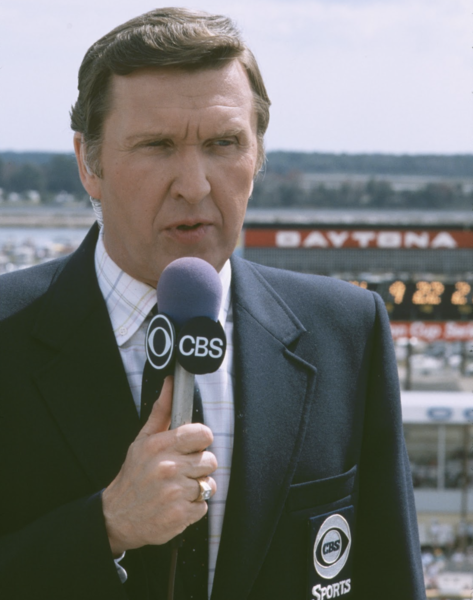
The owner of the voice that introduced millions to stock car racing started as a track announcer in the 1950’s at Mallets Bay and Northeastern Speedways in his home state of Vermont. The teenager was branching out from his daily activity as all-around helper, and sometime on-air personality at his father’s radio station WDEV in Waterbury, VT. A generation later, in 1979, Squier would inherit ownership of the station and subsequently add four more stations to form the Radio Vermont Group, While building his local radio dynasty, Squier maintained a strong connection to auto racing. In 1960, he acquired Thunder Road, a ¼-mile high-banked oval in Barre, VT. Squier became known to millions of stock car fans as play-by-play man on the Motor Racing Network (MRN). He landed one of the first network television racing announcer jobs with ABC Sports in 1964. Due to the miniscule menu of motorsports programming, his commenting duties frequently extended to track and field, football, and the World’s Strongest Man contest. He moved to CBS and made history with the first live, flag-to-flag coverage of the Daytona 500 in 1979. Each February, for over two decades, NASCAR followers would mark the end of winter and the beginning of a new racing season with Squier’s call of the “Great American Race”. As an entrepreneurial sidelight to his broadcasting, Squier co-founded World Sports Enterprises, a television production company specializing in Motorsports programming. After a half century of calling the action, Squier can now be found in the commentator’s chair, dispensing elder statesman wisdom at major races on the FOX network.
By Dick Berggren
On a spring afternoon, at age 14 Ken Squier stood on the back of a flatbed truck at the Morrisville, Vermont, Speedway. Microphone in hand, as the track's announcer he called the day's races. Squier was beginning what has become a 60-year career in our sport during which he has contributed enormously to the enjoyment of millions of fans as he's told stories about common people doing uncommon things as racers. Along the way, those contributions have helped to grow the sport.
Squier is above all else a race fan. He loves racing and the people who populate it. Just listen as he tells his stories on air and you can hear the enthusiasm in his voice. Or go back and listen to his calls as Squier anchored many CBS and TBS broadcasts, bringing live stock car racing into the homes of millions of Americans.
Best known for his on-air work at CBS, Squier helped develop much of what we now appreciate and enjoy when listing to racing on the radio or watching it on television.
Ken and Roger Bahre cleared the stations to create what went from a single radio station carrying NASCAR races to become today's Motor Racing Network (MRN). That network today covers NASCAR's top three divisions with live broadcasts on syndicated stations as well as on Sirius Satellite radio. It's OK to call Squier a founding father of MRN.
He was also a founding father of live flag-to-flag TV auto race coverage. Squier not only anchored the dramatic 1979 Daytona 500 on CBS, he was instrumental in talking the network into carrying the show. It was the first 500 mile stock car race carried live in its entirety on over-the-air broadcast television.
As other networks became involved, Squier and his partner Fred Rheinstein's founded and ran World Sports which played a major role.
Squier's Motorweek, which aired weekly on TBS, was the original auto racing magazine on television. There have been dozens of imitators since.
At age 21, Squier built Thunder Road Speedway in his home state of Vermont. With his partner Tom Curley, in the 1960s he created a five-night-per week circuit for local short track racers.
He has been a trusted advisor to people in every level of racing from NASCAR head Bill France Jr. to New Hampshire Motor Speedway creator Bob Bahre, to many of the sport's television personalities and even to local racers.
Squier named the Daytona 500 "The Great American Race." His call of the 1979 race is the most famous and the most replayed of any in the history of stock car racing.
For many of today's racing-on-television announcers, Ken Squier is the gold standard. Every good announcer in the sport has done his best to follow Squier's lead of story-telling, intense preparation, of communicating the excitement of the sport to its audience, and of making understandable the complexity of an exceptionally intricate sport.
The 70-something year old Squier remains very active. In addition to his racing activities, he and his wife Elizabeth operate a sheep farm in Vermont. He's also chairman of the Vermont Symphony Orchestra.
As others in his age group have long given up working and retired to rocking chairs on the front porch, Squier still runs his Thunder Road Speedway, the most successful short track in America. Running on Thursday nights, the pits are full of cars whose drivers thrill standing-room-only crowds to some of the most exciting racing in America.